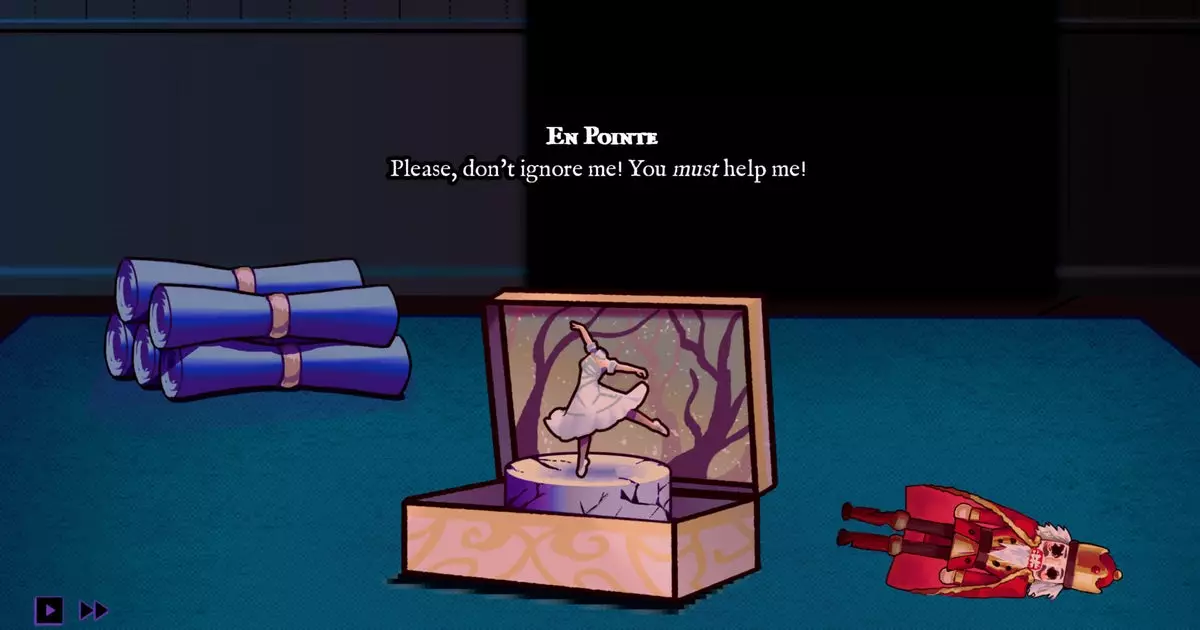At first glance, “Toy Box” presents itself as a whimsical and festive endeavor, one that evokes the spirit of holiday cheer with its theme centered around toys and their maker. However, upon closer inspection—especially through the lens of its trailers and gameplay footage—the game’s true nature unfurls, revealing a landscape riddled with eerie undertones and unsettling themes. As a free visual novel, “Toy Box” invites players into the world of a toy inspector employed by the Grand Toy Maker, a figure shrouded in mystery, whose presence looms just above the game’s frame. The joviality suggested by the title quickly dissipates as players learn of the disassembly tasks they are required to perform on seemingly sentient toys.
Taking on the role of an inspector in this realm means confronting the moral complexities embedded within the game. The primary objective is to carefully dissect toys—five distinct models in total—based on the Grand Toy Maker’s bizarre directives. Players face a critical choice: to “salvage” these animated artifacts or to condemn them to a fiery disposal. Each toy interacts with the player in chilling ways, imparting dark memories and elaborating on their own wretched experiences with a vulnerability that starkly contrasts their grotesque appearances. The dialogue delivered by these characters is anything but innocent, evoking themes of anguish and malevolence, which raises profound ethical questions about the player’s decisions. Can one really turn a blind eye to a miniature talking ballerina, regardless of its unsettling nature?
As players progress, it becomes evident that the toys embedded within the narrative extend beyond mere objects; they reflect a profound sense of trauma and existential horror. Accompanied by warnings of graphic content that spans gruesome depictions of violence to unsettling themes of child abuse, “Toy Box” unfurls a tapestry of horror that is rich in psychological depth. The game does not indulge in gratuitous shock value but rather intertwines its scares with an exploration of darker human experiences. Its ludicrous charm quickly morphs into existential dread, much akin to the works of horror authors like Thomas Ligotti and video games such as “Five Nights at Freddy’s.” Here, the horror is not just in the visual grotesqueness of toys but also in the inevitable confrontation with the distorted realities they embody.
As you navigate through this unsettling landscape, the Grand Toy Maker reappears intermittently to measure your moral compass against the choices made throughout the game. He embodies the pressure of societal expectations—the persistent need to maintain an image that disregards the dark truths lurking behind the surface. “It’s of the utmost importance that inspectors upkeep the Maker’s image,” warns the game’s description, adding a layer of psychological tension that keeps players anxiously aware of their actions and their consequences. It begs the question: what constitutes rehabilitation in a world where innocence has been distorted?
Developed by DEADline Studios, a small POC and queer-owned team, “Toy Box” aspires to unveil the dualities of human existence—the good, the bad, and the outright grotesque. It serves as a mirror reflecting societal complexities through the lens of horror. The themes of dismemberment and the abandonment of innocence are skillfully threaded into the narrative, leading players to a deeper understanding of their choices and the weight they carry.
The creative premise of storytelling through the disassembly of objects in “Toy Box” stands as a commendable milestone in the horror genre. While the game unmistakably employs dark themes, it tantalizingly probes the philosophical aspects of existence and morality. With echoes of its predecessor styled narratives, such as “Hardspace: Shipbreaker,” the vast potential for exploring human experiences through the dismantling of objects is a subject worth delving into. “Toy Box,” with its evocative storytelling, sets a fascinating precedent, urging developers to continue pushing boundaries—not just in horror, but exploring the multifaceted human condition from varying perspectives.
“Toy Box” challenges conventional notions of innocence and revels in the uncanny, delivering a haunting narrative and an engaging gameplay experience that lingers long after the virtual toys are dismantled.


Leave a Reply